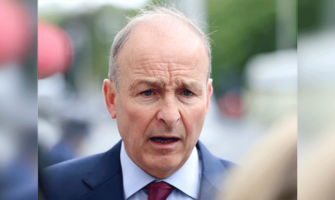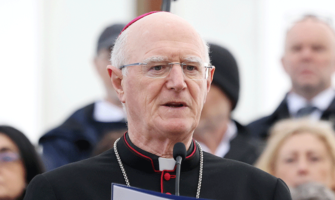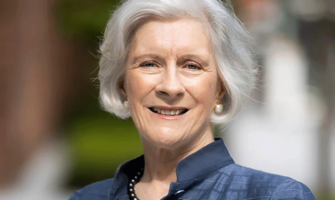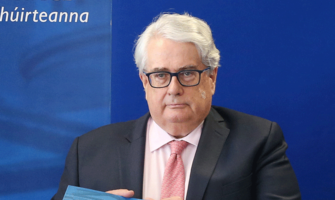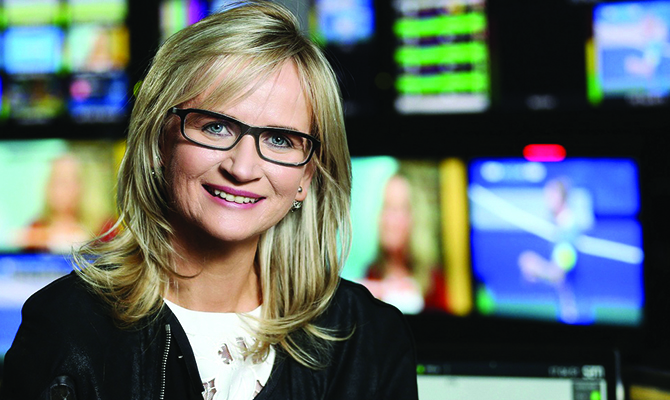
Dee Forbes
THAT RTÉ should scoop €107.5m for its Montrose land bank and yet still be in financial straits says it all about the apparently insuperable problem of sustaining a public service broadcast station. Having sold off the family silver which provided the security for its €50m bank loans, RTÉ is facing a real financial squeeze not far down the road. Competition from new multimedia platforms and globally financed TV companies are already affecting RTÉ’s bottom line while Fine Gael refuses any hike in the TV licence fee. So what will Dee Forbes do to avert the oncoming crisis?
Forbes was parachuted into the top job at Montrose last year – over the heads of RTÉ programmers’ champion Kevin Bakhurst and head of TV Glen Killane – to become the first DG in 25 years with no programming experience. The selection rationale was clear: management suit required to avert financial crisis; no programmers need apply. Forbes’s CV basically consists of two high-flying executive jobs: first a 14-year stint at Turner Broadcasting where she seems to have carried out every broadcast media function – from advertising sales to general management and running entertainment channels – except programme making. Typical of the programmes purveyed by Forbes in this part of her career are film channel TCM, Cartoon Network and Boomerang which offers kids games, videos and more cartoons.
Later at Discovery Network, Forbes became president and MD of the western Europe division which reached into millions of EU homes with dozens of channels on history and animal life; programmes about sharks and Nazis, as someone put it. A €1.3bn deal in 2015 whereby Discovery and its Eurosport channel acquired exclusive rights to the Olympics from 2018 to 2022 across all platforms in 50 countries indicates the kind of media business Forbes is used to handling. But this is another universe compared to RTÉ’s finances and its public service remit. And if the new DG has a strategic masterplan to transform RTÉ, she has yet to reveal anything other than a structural change that refers to “integrated content structure”, redundancies and the age old demand for a huge increase in the licence fee.
The content designation has bemused many programmers who believe that content has always been the essence of what they are about. But language like this has also created the perception that Forbes is addicted to PR speak in her many messages to staff, delivered at meetings or via emails declaring her admiration for programmers. RTÉ is a “creative cultural beacon … there is a very strong connection through news and current affairs … I would like the connection to be as strong in the cultural aspects … media is in a challenging place at the moment”. RTÉ, she says, needs “a living and breathing” document for change and so on.
The trouble with such management jargon is that being mostly cynical creatures, journalists react negatively to such waffle and Montrose is full of such sceptics. At the first of several ‘town hall’ meetings in the Borough of Montrose last year, Forbes’s glib and content-bereft answers to various queries from editorial sophisticates saw her get off to a bad start. And she has yet to recover with more than one bungling initiative since then damaging her image further.
Forbes has also said she is looking at more music, drama and the arts to see if they could achieve her cultural goal, but as this qualified aspiration indicates, she knows very well this costs money – money that RTÉ has not got. Interviewed recently by The Irish Times, RTÉ’s group commercial director, Willie O’Reilly, repeated Forbes’s repetitive mantra about Brexit eroding RTÉ’s advertising revenue from firms with UK head offices. (O’Reilly added the recent British general election to the global political events that Forbes has said are conspiring against the station) and which have cut a hole in RTÉ’s advertising income. The same article pointed out that from a peak of €245m in 2007, RTÉ’s revenue had declined to €155m, the latest available figure, in 2015.
LICENCE FEE FOCUS
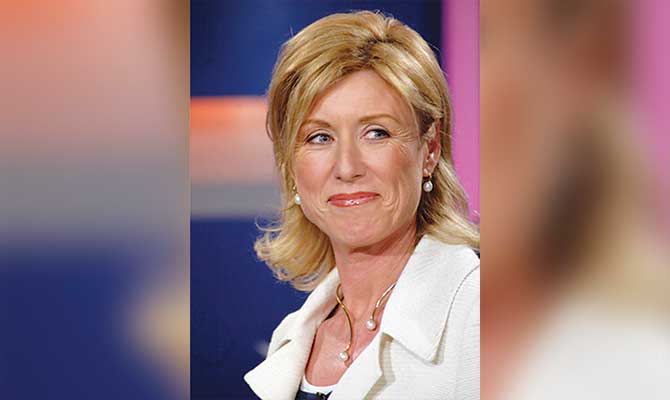
Moya Doherty
The only specific plan or strategy Forbes has brought to RTÉ’s survival path is the rather jaded and distinctly non-private enterprise demand for more taxpayers’ money with repeated requests for an increase in the annual €160 licence fee. Last October she cited Brexit pressure on UK advertising, the high cost of 1916 celebrations and Olympics coverage as reasons for RTÉ’s financial situation and why licence fee evasion, and the need to increase the fee had to be considered. In this interview with the Sunday Independent she appeared to acknowledge that the desired household charge (a licence fee to be levied regardless of any TVs in a household) had been shelved. But several weeks later she told the Oireachtas Committee on Communications that the licence fee system was no longer fit for purpose and a household charge was the most sensible solution. She added the uncertainty created by Donald Trump’s election to her arguments about Brexit causing financial problems.
In February Forbes again referenced the villainous Trump and Brexit as posing enormous commercial challenges for RTÉ but the following month she blundered spectacularly when she told RTÉ’s Today with Seán O’Rourke that the licence fee should be doubled. Within an hour or so she retracted her statement saying she was only pointing out what good value the licence fee is and that it would be worth it at twice the price. The text of the interview is as follows:
O’Rourke: “Have you asked for increase?”
Forbes: “We absolutely have.”
O’Rourke: “… and the answer?”
Forbes: “It’s ongoing. It’s ongoing … I think it’s incredible value for money … Quite honestly I think it should be double that.”
Hoist by your own station.
In her amended statement (“Any notion that it be doubled is nonsense”) she also said that all she was looking for was reform of An Post’s licence fee collection system – reckoned to be leaking tens of millions of euro a year. This, of course, is what communications minister Denis Naughten has repeatedly told her whenever she demands a licence fee rise.
LAND SALE
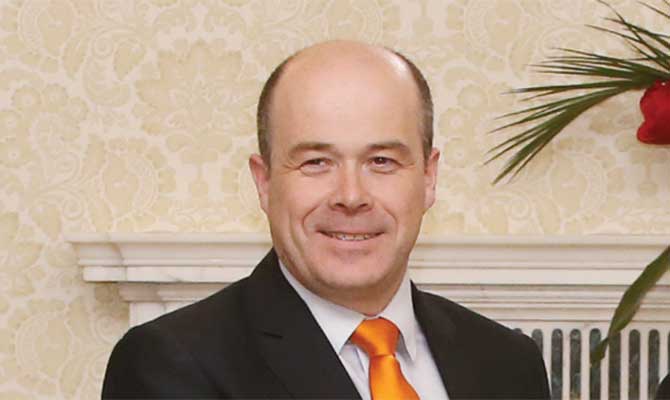
Denis Naughten
This PR howler obscured other announcements that day, namely, confirmation that RTÉ was to sell part of its Montrose land, the announcement that executive and structural changes were to take place and that a “voluntary exit” (250 jobs to go via redundancies and retirement) would be introduced. The land windfall later rose from an initially anticipated €50m to €75m and finally an actual sale price of €107m. But again using the IT as a platform, Forbes made clear last week that practically the entire €100m dosh would be spent on much needed capital investment, studio upgrading and the clearance of the €50m circa debt. So the solution to RTÉ’s ongoing financial problem lies not in the land sale but, again, in securing a licence fee increase and Forbes is preparing for yet another campaign ahead of the autumn budget to achieve this goal.
A similar misjudgment came when she made what she may have thought was a bold initiative in outsourcing production of RTÉ’s children’s programmes last November. This followed yet another an unsuccessful pitch, at the Oireachtas communications committee for a licence fee increase and Dee might have thought Denis would have his mind concentrated with a message that said “if we don’t get a licence fee increase, then we won’t make kiddies’ programmes”. This revealed not only lamentable political ignorance but also unfamiliarity with unions, especially public service unions as exemplified by the brothers and sisters at Montrose. Forbes was forced to backtrack within weeks and the station issued a statement saying it would continue to produce children’s programmes “while maintaining the necessary savings that had previously been identified”. With exquisite timing this attack on the nation’s children was publicised in the run-up to Christmas and was the first cost-cutting measure announced by Forbes since becoming DG.
Some programmers in Montrose claim that Forbes is out of her depth and her natural hinterland – cheap but profitable TV on a grand, global scale – is far removed from the complex broadcasting Irish scene. Significantly, she offered a rather lame response to a media suggestion that her experience was in commercial management and she was weak on content. “I don’t think you can be in a management position in any media company without having an appreciation of content,” she bristled to the Sindo. And she indicated the same self confidence when stating that she had always told herself that if she ever returned to Ireland it would have to be as head of RTÉ.
Forbes cannot be judged in isolation from the woman who selected her as DG, board chair Moya Doherty. Both women are broadcasting successes in the private sector, selling middle to low brow TV and entertainment. Both have been drafted in to RTÉ to save the state broadcaster and, allegedly, retain its public broadcasting standards. Neither has had to operate in such a difficult financial climate while at the same time satisfying criteria of taste and programming standards. They would probably have agreed – and perhaps privately still do – with the relentless right wing attacks on the “cosseted” public sector programmers who rely on state hand-outs and who allegedly harbour a left of centre bias. (The counter argument from the left is that the station’s current affairs output has been neutered by the government’s licence fee stranglehold).
The hopelessly optimistic notion that appointing “dynamic” private sector business women Doherty and Forbes to save RTÉ has so far resulted in a welter of rhetorical statements from both behind which lies nothing more than the much derided public sector demand for a greatly increased licence fee. Doherty’s linguistic master class in this strategy came last December when she wrote of RTÉ framing modern Irish identity – “the diaspora … re-imagining the nation … a sense of cultural citizenship … a period of tectonic shift” and so on. But buried in the script was a demand for “new funding” which would be determined by a government that recognised “its role … in ensuring that financially and culturally, we get the public service broadcasting we deserve”.
So far Forbes has parroted Doherty’s screenplay and the only indication of a response to the tectonic media shift was a sentence in Forbe’s March statement (the corrected statement about not wanting to double the licence fee at all, at all). There, Forbes said she was intent on creating “new content divisions [to] replace existing radio, television and digital divisions”. Over the years the division of TV, radio, news and current affairs and more latterly digital, had been separate entities which had resulted in each of them expanding into mini-empires. Changes introduced to staff last week are intended to abolish these demarcation lines and consequent bureaucracies, streamlining their efforts and eliminating duplication. It will take some time to see if such an organisational reform produces results.
FINANCIAL SAVIOUR
Interestingly, the top RTÉ job is not Forbes’s first Irish media posting and she was a non-executive director of Irish Times Ltd (ITL), resigning about three months before the announcement that she had landed the DG job in March, 2016. This indicated foreknowledge of her appointment but it also raises an ongoing suspicion that the equally cash stricken IT has been sending signals to John C Malone, the billionaire owner of Liberty Global. This company bought TV3 two years ago and the media mogul is also owner of Discovery Communications where Dee was such a success before joining RTÉ. The IT positively drooled over Malone in an interview and profile recently (see The Phoenix, 10/2/17) pointing out his ethical approach to media management and his appreciation of things Irish and cultural. And, of course, his very deep pockets and “stellar” business acumen. More recently, IT editor Paul O’Neill told the Sunday Business Post that while he was not holding his breath he would be “very pleased” if a financial saviour was to come along and rescue the newspaper from financial disaster. Was Dee invited on to the ITL board to build bridges to her old boss, Malone and might she have a role to play if things don’t work out at RTÉ?
Has it not yet dawned on Montrose that it is now facing what might be called the Bus Éireann treatment from government? No doubt as a result of pressure from the EU, state support for semi public operations is coming under increasing strain and Dee Forbes is just wasting her breath in calling for an increased licence fee.
RTÉ is being forced to live within its means and following the sale of its “silver” security, its capacity to borrow is now severely limited. Perhaps Dee should have a look at what happened in Israel recently where the 49-year-old public service station, Israel Broadcasting Authority (IBA), was put into liquidation. This was done on grounds that the station was too bureaucratic, costly and had too many employees. The new Israeli Public Broadcasting Corporation (IPBC or KAN) station has re-hired over 400 IBA employees, which will have a full staff of fewer than half the former IBA’s 1,050 employees.
Israel’s premier, Benjamin Netanyahu, who has criticised the IBA of being overly critical of his right-wing government, has been accused of wanting to control the media. The IBA was funded largely by licence fees. Sound familiar?






